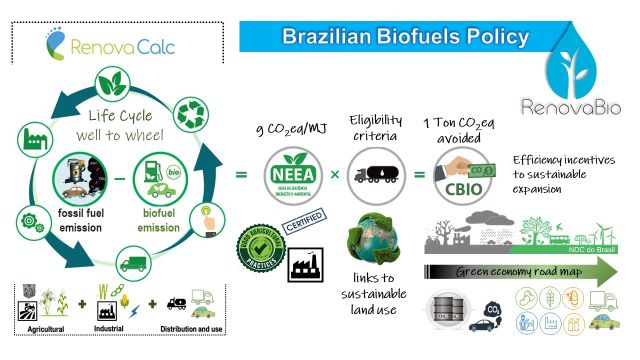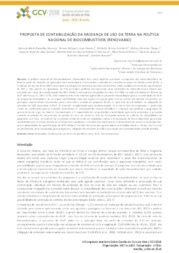Embrapa Agrobiology
 Busca de Notícias
Busca de Notícias
Article: The science behind Brazilian Biofuels Policy – RenovaBio
Insights on how Brazil is innovating and investing in the low carbon economy, especially in agriculture and energy.
RenovaBio is a market driven incentive mechanism, based on the economic theory of “Coase Market” for pricing externalities. It transfer the social/environmental costs of using fossil fuels as an income to the production of biofuels.
It values the service of GHG withdrawal from the atmosphere made by the biofuels.
This mechanism brings incentives to the sustainable expansion of biofuels, based on efficiency. RenovaBio creates a “Carbon Credits" per unit of energy increasing efficiency in the production of biofuels, certified individually by producer.
RenovaBio creates an integrative agenda for a smooth transition on transportation energetic matrix. And values the great potential of energy production from biomass in Brazil (especially sugar cane, corn, soy and residues - eg tallow). It allows the integration of different biofuels (ethanol, biodiesel and biomethane) in the Brazilian transportation matrix, which already has infrastructure (filling stations) and technology (flex-fuel engines, for example) to promote this transition very efficiently.
But, what is the science behind RenovaBio? What are the metrics used to make the expansion of biofuels sustainable and to promote the reduction of GHG emissions?
A multidisciplinary group of scientists, including specialists on Agricultural Production Systems; Geoprocessing; Modeling for Land Use Change; Modeling of Biofuel Production Processes and Life Cycle Assessment, developed this central component of RenovaBio – its principles and methodology.
The central principle of RenovaBio is the calculation of the Energetic-Environmental Biofuel Index (NEEA), which is the difference in emissions (given in gCO2eq/MJ) between fossil fuel and substitute biofuel, through a Life Cycle Assessment “from well to wheel” approach.
To make the calculations operational, we developed the RenovaCalc, a scientifically robust tool, yet easy to use. It has sensitivity to distinguish GHG emissions in the biofuels production life cycle from each production unit. So, RenovaCalc is a customized LCA-based tool developed to run calculations and support RenovaBio certification scheme on the climate change impact category.
We did some methodological decisions and assumptions. RenovaCalc’s framework is based on "well to wheels" attributional LCA approach using energy allocation criteria (for co-products) for calculating of sucarcane and corn ethanol, biodiesel, biomethane and biojetfuel grades (NEEA). Background data (carbon profiles of inputs, like fertilizers, electricity, etc.) comes from Ecoinvent 3.1 database and emission and characterizations factors from IPCC.
The RenovaCalc is designed to account for GHG emissions across the entire biofuel life cycle and generate a Biofuel Carbon Intensity, that subtracted from the fossil fuel CI generates the Energetic-Environmental Biofuel Index (NEEA). The NEEA reflect the individual contribution of each production agent, vis-à-vis the mitigation of a specific amount of greenhouse gas, in relation to its fossil substitute (in terms of tonnes of CO2eq).
To convert the Energetic-Environmental Biofuel Index (NEEA - given in gCO2eq/MJ) into Decarbonisation Credits (CBIO - given in ton CO2eq avoided), NEEA is multiplied by the eligible volume of biofuel. Here another very important concept of the Policy.
Eligibility Criteria are requirements that link biomass production to sustainable land use, through LUC risk management mechanisms, and includes:
- No native vegetation suppression (since November 2018). Zero deforestation in biomass production;
- Comply local environmental legislation (like Brazilian Farm Environmental Registration - CAR);
- Comply agro ecological zoning (if applicable).
The Biofuel Decarbonisation Credit (CBIO) is a financial product backed by CO2 emissions, traded on the stock exchange and issued by the biofuel producer, based on the commercialisation of their certified production.
Fossil Fuel distributors must meet the target (national emission reduction targets for the fuel mix, set for a 10-year period) by demonstrating the required amount of CBIOs on their property. Other agents (individuals and companies) will be able to buy and sell CBIOs on the stock exchange, as a way of bringing more liquidity to this market or a green bond abroad.
It is a Green economy road map for transportation transition to a low carbon economy.
With its powerful tools and mechanism, it is expected that RenovaBio can stimulate competition and encourage producers to be more efficient taking a Life Cycle Management approach in its routines. Research and innovation in new technologies development for system improvement (e.g. machinery efficiency, chemicals, fuels and fertilizers changes towards sustainable sources) and price and market analysis tends to grow with the success in RenovaBio implementation.
* Agronomist, master and PhD in Agronomy/Plant pathology from the Federal University of Viçosa (UFV), researcher and head of Embrapa Environment. Member of the RenovaBio Technical Committee.
Marcelo A. B. Morandi
Embrapa Meio Ambiente
Press inquiries
marcelo.morandi@embrapa.br
Phone number: (19) 3311.2700
Embrapa Meio Ambiente
Press inquiries
meio-ambiente.imprensa@embrapa.br
Phone number: (19) 3311.2608
Further information on the topic
Citizen Attention Service (SAC)
www.embrapa.br/contact-us/sac/


